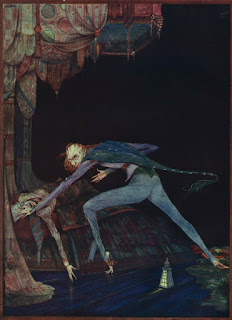 |
| Crisis in Six Scenes, by Woody Allen |
PEOPLE ARE LIFE, by Aurora Ledesma
Vangeli, a Greek Cypriot barber, is cutting the hair of an elderly customer. It’s the last customer of the day for him, and he is quite tired when the working day is over. The customer confesses that is mother has just died. He had lived with his parents all his life and feels a bit abandoned now.
The barber senses that the
man’s reflection in the mirror reveals more than his speech. Vangeli tries to
sympathise but wants to know what is the full message. He asks himself, What is he telling me? That he is all alone
in the world?
The barber offers the
consolation that is apparently expected of him with phrases like:
“Well it had to happen”, “Sooner or later”, “Eighty – Three’s not a bad
age”, “But you have friends”, “If you have people to see and talk to, then you
have friends”, “If you have people, you have life”.
The talkative barber
narrator dispenses bits of wisdom like the story title to the customers who
want a little philosophy with their hair-cut.
The protagonist is just as
lonely and friendless as his customer. His mother and father died years ago in
Cyprus. His English wife Irene died too, just three years ago. They’d been
split up for years. He has two grown-up boys also who are both in computers and
are embarrassed by their father who’s just been a barber all his life. Despite
his loneliness and his problems, he says nothing to his customers. He knows how
to listen to the sorrows of the others but he has no one to tell his own. At
the end of the day, what he likes most is to get home and have a beer.
When he finishes serving
his customers, he pats them on the shoulder and tells them.
-“ Thank you for the tip, and now go and live your life”.
Some reflections
The story makes us reflect
on the true childhood friends with whom we shared everything, our homes, games,
worries, sorrows and joys, friends with whom we spent all our time together and
later in adulthood we wonder, where are the real friends now? Maybe, like the
barbershop customer, we only have people with whom to share anecdotes in a café.
Even the protagonist Vangeli, who, after a lifetime in England, doesn’t know
the names of his customers and is surprised by some English reactions, doesn’t
have real friends.
QUESTIONS
Can you make a summary of the narrator’s life?
“People are life” versus misanthropy / loneliness.
What are the benefits and the shortcomings of one kind of attitude versus
another?
“The last costumer is different”. Do you think people
treat costumers differently according to the time of the day? For the barber, why
the last one is different?
Different kinds of friendship: people to whom you say
hello, people who you meet, mates at work, friends… How can you define true
friendship? Is a real friend “someone you can talk to”?
Is a barber a kind of psychologist, philosopher,
confessor (he didn’t know his costumers’ names)? And the hairdresser?
What do you think of this type of communication?: The
barber looks at the man who is talking to through the mirror. Is it
similar to the communications through mobiles or computers?
Do you think there is a relation between the way you
wear your hair and your personality? And what about your hair’s shape, colour…?
“We are in each other’s lives: that’s having friends”:
do you think is it a good definition? Why?
What do you know about Cyprus? History, politics…
Did the costumer really need a haircut? How do you
know? Do you go to the hairdresser if you have to go to a funeral?
Are you embarrassed by your parents’ jobs? Are there “low”
jobs or only “low paid jobs”? Who usually does the “low paid jobs” nowadays?
“It’s how the English are.” What are English people
like? Is it all clichés?
Do you think is it easy to become a barber?
What differences can you find between a barber and a
women’s hairdresser?
VOCABULARY
snipped, hefty, tough, crinkly, clippers, split up, gabble
away, regular, flick

